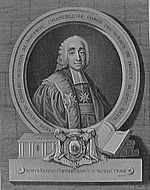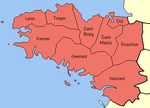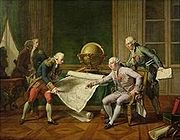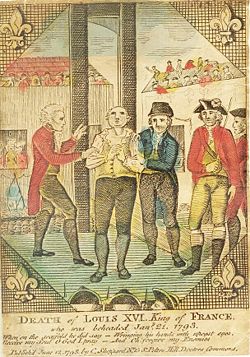
Bertrand de Molleville
Encyclopedia
Comte
Antoine François Bertrand de Molleville (25 October 1744, Toulouse - 19 October 1818, Paris) was a French politician.
He was considered a fiery partisan of royalty, and surnamed the enfant terrible of the monarchy
. He was first conseiller to the Parlement de Toulouse in 1766, then maîtres des requêtes
in 1774 and finally Intendant de Bretagne, in 1784. Bertrand de Molleville was then charged in 1788 with the difficult task of dissolving the Parliament of Brittany
. Favourable to the gathering of the estates general
in 1789 , he advised Louis XVI
after the dissolution of the Assemblée. Made ministre de la Marine et des Colonies from 1790 to 1792, he organised the mass emigration of officers. Due to numerous denunciations, he retired from his functions and became chief of the royal secret police. Before and after the 10 August
1792, he tried to organise an escape for the king, but he was eventually forced to resolve to flee to England himself. Despite his dedication and his friendship for, he was one of his most untalented servants.
 Antoine François de Bertrand de Molleville was received as a conseiller to the Parlement de Toulouse in 1766.
Antoine François de Bertrand de Molleville was received as a conseiller to the Parlement de Toulouse in 1766.
His secretary was Bernard François Balssa, father of Honoré de Balzac
, still in de Moleville's service in 1771.
Antoine François de Bertrand de Molleville served his apprentice in the school of minister Maupeou. He was maîtres des requêtes
in 1774.
In 1775 Bertrand de Molleville defended the memoir of his ancestor chancellor Jean Bertrand, seigneur de Frazin, attacked by Condorcet in his Éloge du chancelier de L'Hôpital, but he only published this apology after having communicated it to Condorcet lui-même.
Antoine François de Bertrand de Molleville was made Intendant de Bretagne in 1784.


 On his death in 1818 he was buried in the church of Ponsan-Soubiran
On his death in 1818 he was buried in the church of Ponsan-Soubiran
.
Comte
Comte is a title of Catalan, Occitan and French nobility. In the English language, the title is equivalent to count, a rank in several European nobilities. The corresponding rank in England is earl...
Antoine François Bertrand de Molleville (25 October 1744, Toulouse - 19 October 1818, Paris) was a French politician.
He was considered a fiery partisan of royalty, and surnamed the enfant terrible of the monarchy
Monarchy
A monarchy is a form of government in which the office of head of state is usually held until death or abdication and is often hereditary and includes a royal house. In some cases, the monarch is elected...
. He was first conseiller to the Parlement de Toulouse in 1766, then maîtres des requêtes
Maître des requêtes
Masters of Requests are high-level judicial officers of administrative law in France and other European countries that have existed in one form or another since the Middle Ages.-Old Regime France:...
in 1774 and finally Intendant de Bretagne, in 1784. Bertrand de Molleville was then charged in 1788 with the difficult task of dissolving the Parliament of Brittany
Parliament of Brittany
The Parlement of Brittany was a court of justice, under France’s Ancien Régime, with its seat at Rennes. The last building to house the parlement still stands and is now the Rennes Court of Appeal, the natural successor of the parlement.-Parlements under the Ancien Régime:As with all the...
. Favourable to the gathering of the estates general
Estates-General of 1789
The Estates-General of 1789 was the first meeting since 1614 of the French Estates-General, a general assembly representing the French estates of the realm: the nobility, the Church, and the common people...
in 1789 , he advised Louis XVI
Louis XVI of France
Louis XVI was a Bourbon monarch who ruled as King of France and Navarre until 1791, and then as King of the French from 1791 to 1792, before being executed in 1793....
after the dissolution of the Assemblée. Made ministre de la Marine et des Colonies from 1790 to 1792, he organised the mass emigration of officers. Due to numerous denunciations, he retired from his functions and became chief of the royal secret police. Before and after the 10 August
10th of August (French Revolution)
On 10 August 1792, during the French Revolution, revolutionary Fédéré militias — with the backing of a new municipal government of Paris that came to be known as the "insurrectionary" Paris Commune and ultimately supported by the National Guard — besieged the Tuileries palace. King Louis XVI and...
1792, he tried to organise an escape for the king, but he was eventually forced to resolve to flee to England himself. Despite his dedication and his friendship for, he was one of his most untalented servants.
Youth

His secretary was Bernard François Balssa, father of Honoré de Balzac
Honoré de Balzac
Honoré de Balzac was a French novelist and playwright. His magnum opus was a sequence of short stories and novels collectively entitled La Comédie humaine, which presents a panorama of French life in the years after the 1815 fall of Napoleon....
, still in de Moleville's service in 1771.
Antoine François de Bertrand de Molleville served his apprentice in the school of minister Maupeou. He was maîtres des requêtes
Maître des requêtes
Masters of Requests are high-level judicial officers of administrative law in France and other European countries that have existed in one form or another since the Middle Ages.-Old Regime France:...
in 1774.
In 1775 Bertrand de Molleville defended the memoir of his ancestor chancellor Jean Bertrand, seigneur de Frazin, attacked by Condorcet in his Éloge du chancelier de L'Hôpital, but he only published this apology after having communicated it to Condorcet lui-même.
Antoine François de Bertrand de Molleville was made Intendant de Bretagne in 1784.
Intendant de Bretagne (1784-89)

Minister for the Fleet and the Colonies

After the day of 10 August 1792

Ponsan-Soubiran
Ponsan-Soubiran is a commune in the Gers department in southwestern France.-Geography:The Petite Baïse flows north through the middle of the commune; then forms part of the commune's northern border.-Population:-References:*...
.
Works
Sources
- Histoire de la Révolution française by Jules MicheletJules MicheletJules Michelet was a French historian. He was born in Paris to a family with Huguenot traditions.-Early life:His father was a master printer, not very prosperous, and Jules assisted him in the actual work of the press...
- Lapeyre et Rémy Scheurer, Les notaires et secrétaires du roi sous les règnes de L. XI, Ch. VIII et L. XII (1461–1515), Tome 2. Paris, 1978, in-4, 91 tablx, B.n.F. : 4° L45. (4-II)
- Gustave Louis Chaix d'Est-AngeGustave Louis Chaix d'Est-AngeGustave Louis Adolphe Victor Aristide Charles Chaix d'Est-Ange was a French lawyer and politician.-External links: on -Source:...
, Dictionnaire des familles anciennes ou notables à la fin du XIXe siècle, Évreux, 1903–1929, 20 vol. in-8, e, tome : 4, p. 148 et suivantes, B.n.F. : 8° Lm1. 164 - Jules Villain, La France moderne, tome : 3, B.n.F. : 4° Lm1. 180
- Le Père AnselmePère AnselmePère Anselme was a French genealogist.He was born in Paris in 1625. As a layman his name was Pierre Guibours...
, Histoire de la maison royale de France et des grands officiers de la couronne, 3e éd. Paris, 1726–1733, 9 vol. in-fol, tome : 6, B.n.F. : Fol. Lm3. 398. - Marquis d’Aubais, Pièces fugitives pour servir à l’histoire de France, Paris, 1759, 2 vol. in-4 (t. I, 2e partie, et t. II), tome : 2, B.n.F. : 4° L46. 11,
- Waroquier de Combles, État de la France, ou les vrais marquis, comtes..., Paris, 1783–1785, 2 vol. in-12, tome : 2, 168-9, B.n.F. : 8° Lm1. 34
- Waroquier de Combles, Tableau généalogique et historique de la noblesse, Paris, 1786–1789, 9 vol. in-12, tome : 5, B.n.F. : 8° Lm1. 38

